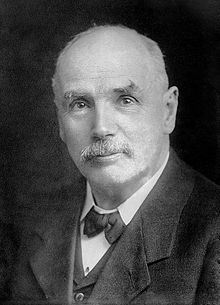George Nicoll Barnes
|
The Right Honourable George Barnes CH |
|
|---|---|
 |
|
| Leader of the Labour Party | |
|
In office 14 February 1910 – 6 February 1911 |
|
| Chief Whip | George Henry Roberts |
| Preceded by | Arthur Henderson |
| Succeeded by | Ramsay MacDonald |
| Minister without portfolio | |
|
In office 17 August 1917 – 27 January 1920 |
|
| Prime Minister | David Lloyd George |
| Preceded by | Arthur Henderson |
| Succeeded by | Christopher Addison |
| Minister of Pensions | |
|
In office 10 December 1916 – 17 August 1917 |
|
| Prime Minister | David Lloyd George |
| Preceded by | Office Created |
| Succeeded by | John Hodge |
| Member of Parliament for Glasgow Gorbals Glasgow Blackfriars and Hutchesontown (1906–1918) |
|
|
In office 8 February 1906 – 15 November 1922 |
|
| Preceded by | Andrew Bonar Law |
| Succeeded by | George Buchanan |
| Personal details | |
| Born | 2 January 1859 |
| Died | 21 April 1940 (aged 81) |
| Nationality | British |
| Political party | Labour |
| Other political affiliations |
Independent Labour Party |
George Nicoll Barnes CH PC (2 January 1859 – 21 April 1940) was a Scottish Labour politician and a Leader of the Labour Party.
Barnes was born on 2 January 1859 in Lochee, Dundee, the second of five sons of James Barnes, a skilled engineer and mill manager from Yorkshire, and his wife, Catherine Adam Langlands. His brother T. B. Barnes was also active in politics, later becoming a Labour Party councillor in Dundee. The family moved back to England and settled at Ponders End in Middlesex, where his father managed a jute mill in which George himself began working at the age of eleven, after attending a church school at Enfield Highway. He then spent two years as an engineering apprentice, first at Powis James of Lambeth then at Parker's foundry, Dundee.
After finishing his apprenticeship he worked for two years at the Vickers shipyard in Barrow before returning once again to the London area, where he experienced unemployment during the slump of 1879. He had a number of short-term jobs before settling for eight years at Lucas and Airds in Fulham.
During his time in London, Barnes became an active member of the Amalgamated Society of Engineers. He stood for the general secretaryship of the union in 1895, but was narrowly defeated by the incumbent, John Anderson. However, the following year, Anderson was dismissed for "wilful neglect of duty", and Barnes easily beat him in a new election. Barnes was a committed member of the co-operative movement, and a keen if moderate socialist, which led him to join the Independent Labour Party on its foundation in 1893.
...
Wikipedia
